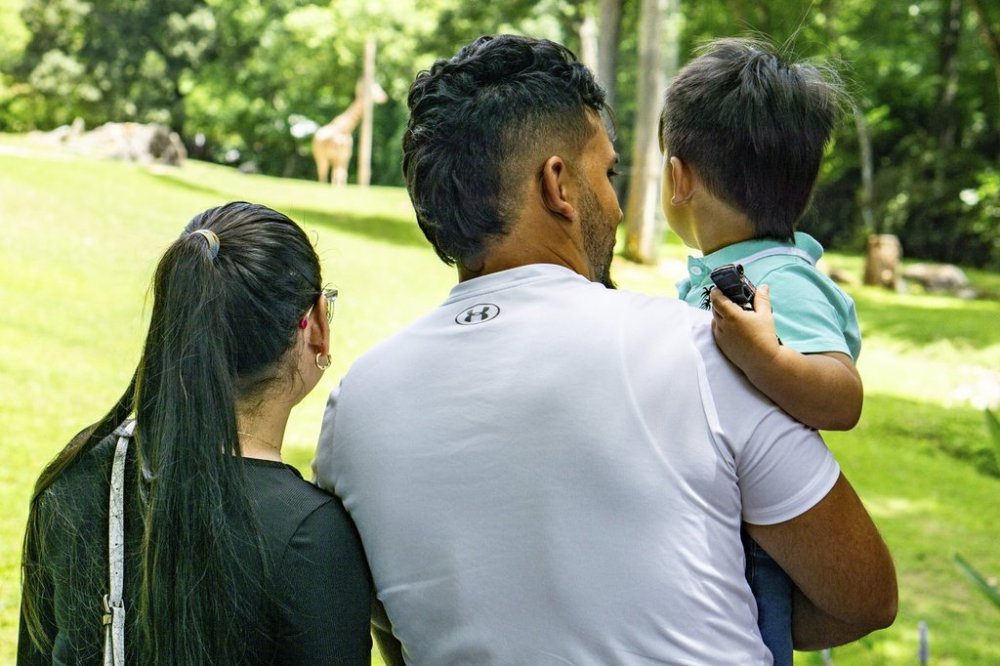Trump cutoff of humanitarian parole for immigrants from Ukraine, 6 other countries challenged
Advertisement
Read this article for free:
or
Already have an account? Log in here »
To continue reading, please subscribe:
Monthly Digital Subscription
$1 per week for 24 weeks*
- Enjoy unlimited reading on winnipegfreepress.com
- Read the E-Edition, our digital replica newspaper
- Access News Break, our award-winning app
- Play interactive puzzles
*Billed as $4.00 plus GST every four weeks. After 24 weeks, price increases to the regular rate of $19.00 plus GST every four weeks. Offer available to new and qualified returning subscribers only. Cancel any time.
Monthly Digital Subscription
$4.75/week*
- Enjoy unlimited reading on winnipegfreepress.com
- Read the E-Edition, our digital replica newspaper
- Access News Break, our award-winning app
- Play interactive puzzles
*Billed as $19 plus GST every four weeks. Cancel any time.
To continue reading, please subscribe:
Add Winnipeg Free Press access to your Brandon Sun subscription for only
$1 for the first 4 weeks*
*$1 will be added to your next bill. After your 4 weeks access is complete your rate will increase by $0.00 a X percent off the regular rate.
Read unlimited articles for free today:
or
Already have an account? Log in here »
Hey there, time traveller!
This article was published 01/03/2025 (219 days ago), so information in it may no longer be current.
MIAMI (AP) — A group of American citizens and immigrants is suing the Trump administration for ending a long-standing legal tool presidents have used to allow people from countries where there’s war or political instability to enter and temporarily live in the U.S.
The lawsuit filed late Friday night seeks to reinstate humanitarian parole programs that allowed in 875,000 migrants from Ukraine, Afghanistan, Cuba, Haiti, Nicaragua and Venezuela who have legal U.S. resident as sponsors.
President Donald Trump has been ending legal pathways for immigrants to come to the U.S. and implementing campaign promises to deport millions of people who are in the U.S. illegally.

The plaintiffs include eight immigrants who entered the U.S. legally before the Trump administration ended what it called the “broad abuse” of humanitarian parole. They can legally stay in the U.S. until their parole expires, but the administration stopped processing their applications for asylum, visas and other requests that might allow them to remain longer.
None are identified by their real names because they fear deportation. Among them are Maksym and Maria Doe, a Ukrainian couple; Alejandro Doe, who fled Nicaragua following the abduction and torture of his father; and Omar Doe, who worked for more than 18 years with the U.S. military in his home country of Afghanistan.
“They didn’t do anything illegal. They followed the rules,” Kyle Varner, a 40-year-old doctor and real estate investor from Spokane, Washington, who sponsored 79 Venezuelans and is part of the lawsuit, told The Associated Press. “They have done nothing but work as hard as they can. … This is just such a grave injustice.”
Almost all of the immigrants sponsored by Varner have lived in his house for some time. He paid their plane tickets. He helped them learn English and get driver’s licenses and jobs. He had 32 applications that were awaiting approval when the Trump administration ended the program in January.
Other plaintiffs include two more U.S. citizens who have sponsored immigrants, Sandra McAnany and Wilhen Pierre Victor, and the Haitian Bridge Alliance, a California-based organization that assists immigrants with legal advice.
“The Trump administration is trying to attack parole from all angles,” said Esther Sung, an attorney from the Justice Action Center, which filed the lawsuit with Human Rights First in federal court in Massachusetts and provided the AP a copy in advance. “The main goal, above all, is to defend humanitarian parole. These have been very, very successful processes.”
The U.S. Departments of Justice and Homeland Security did not immediately respond to requests for comment.
The end of temporary protections for these immigrants has generated little political blowback among Republicans other than three Cuban-American representatives from Florida who called for preventing deportations of the Venezuelans affected. One of them, Rep. Maria Salazar of Miami, also joined about 200 congressional Democrats this week in cosponsoring a bill that would enable them to become lawful permanent residents.
Parole authority began in 1952 and has been used by Republican and Democratic presidents to admit people unable to use standard immigration routes because of time pressure or because their home country’s government lacks diplomatic relations with the U.S.
Under parole, immigrants arrived “for urgent humanitarian reasons or significant public benefit.” They are allowed to work while they seek another legal way to stay in the country.
Trump ordered an end to “categorical parole programs” the day he returned to office.
Joe Biden used parole authority more than any other American president, including for people who arrived using the government’s CBP One app. But the lawsuit covers only certain parole programs.
McAnany, a 57-year-old widow from Wisconsin who designs and teaches procurement and soft skills courses, sponsored 17 people from Venezuela and Nicaragua. She still has four pending applications for approval.
McAnany helped them adjust to their new country and find homes and schools. All now work more than 40 hours a week, pay taxes and pay for their health care, she said.
“I care so much about each of the people that I sponsor,” said McAnany. “I can’t just walk away and give up.”

